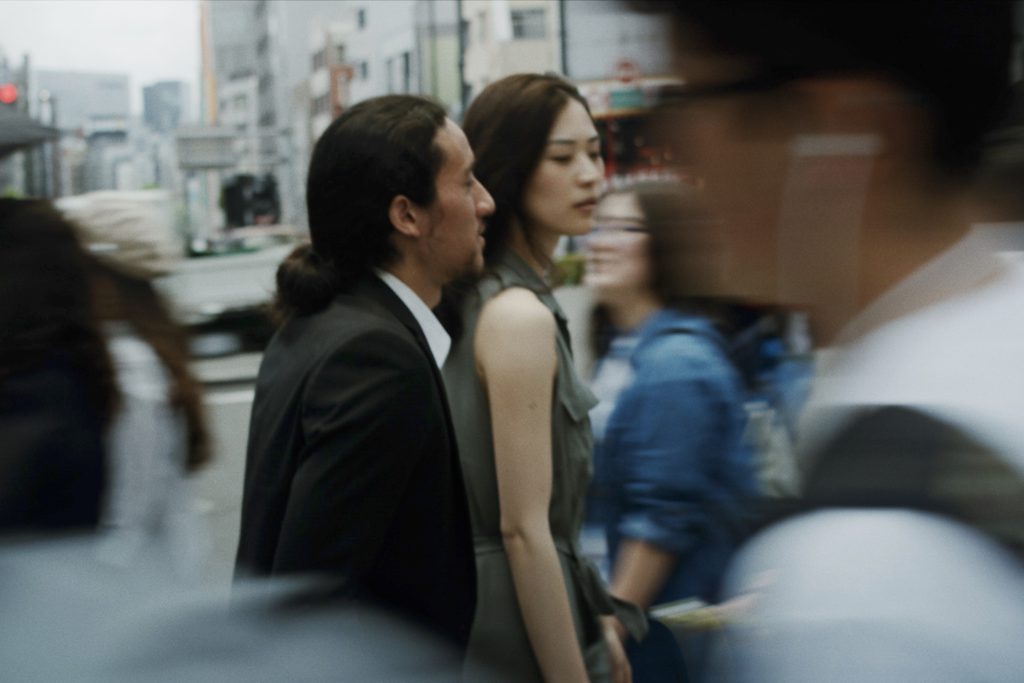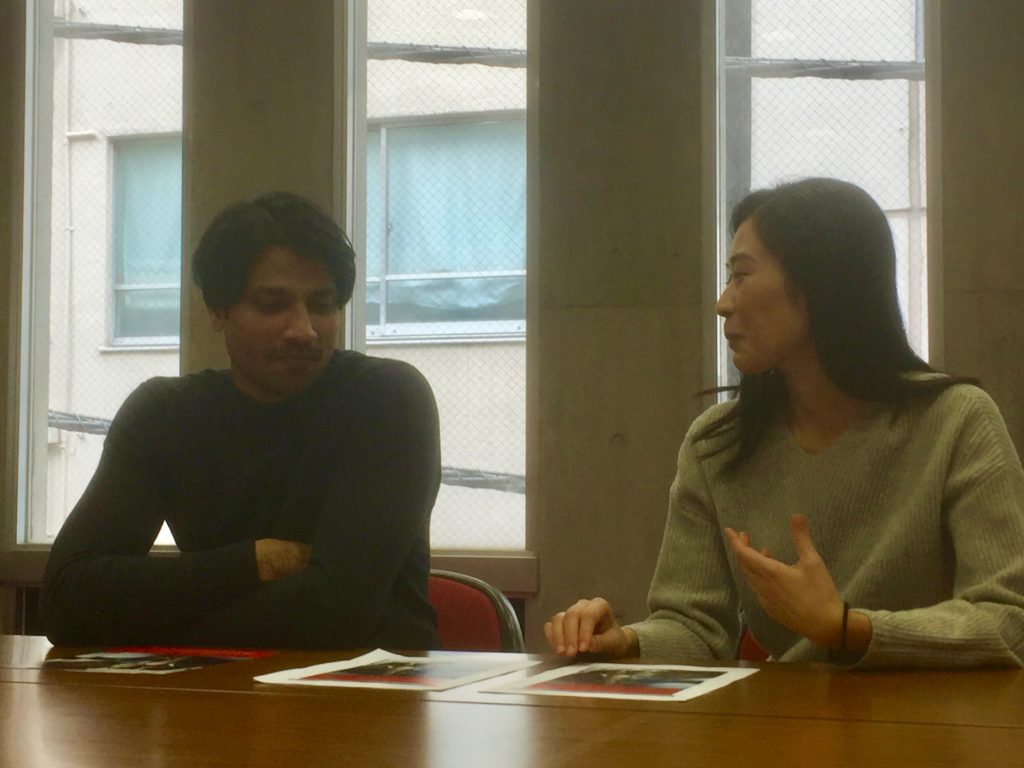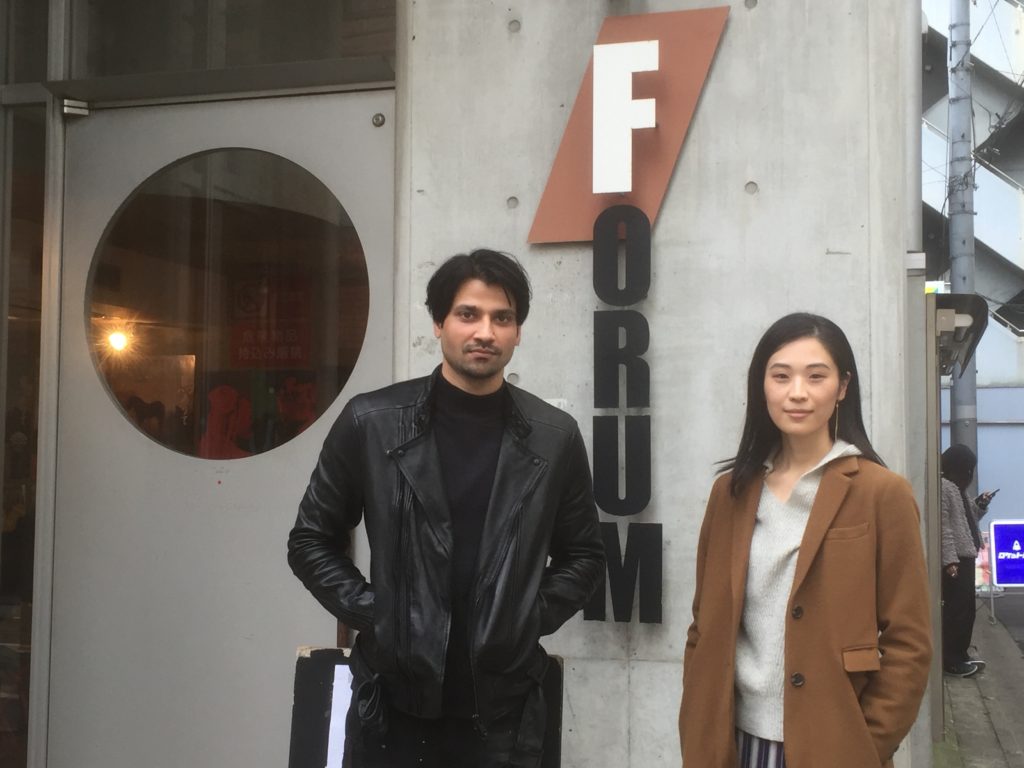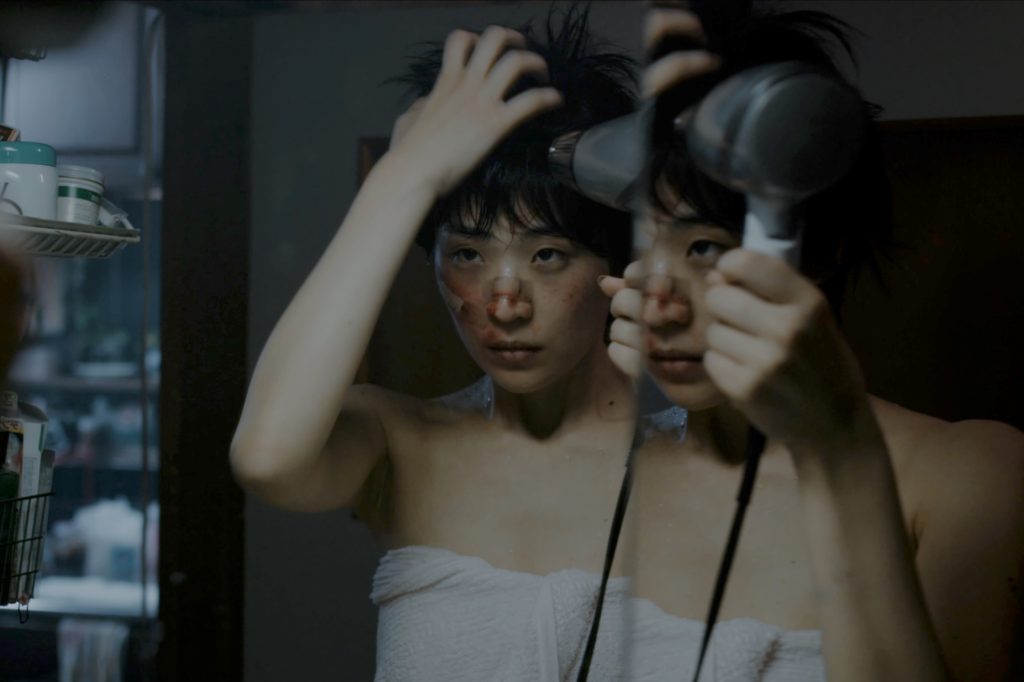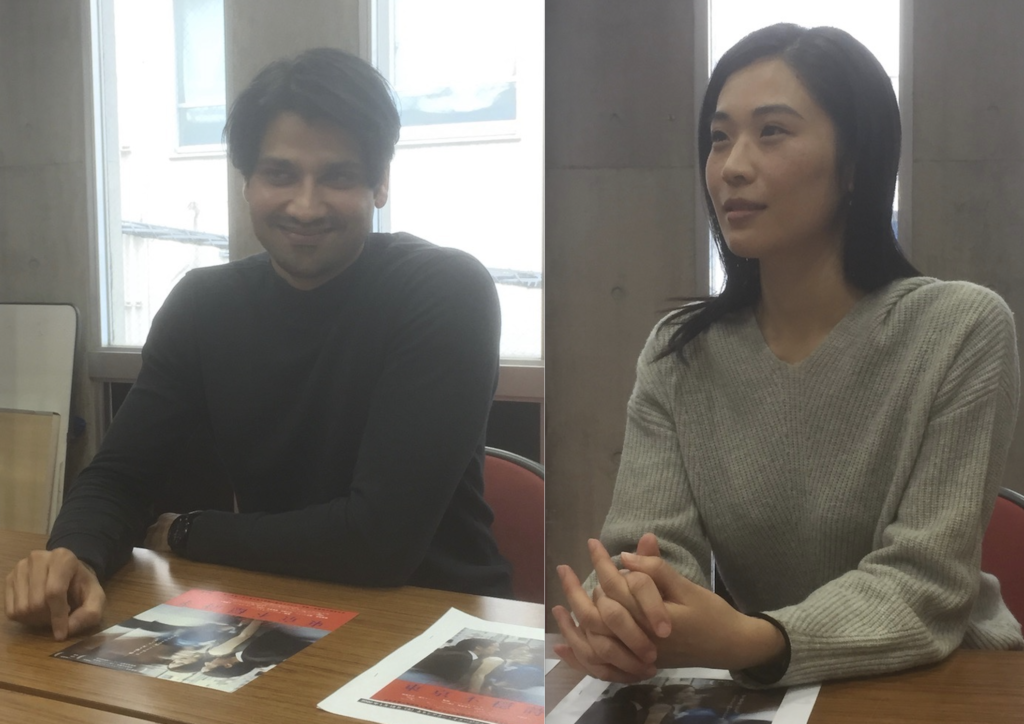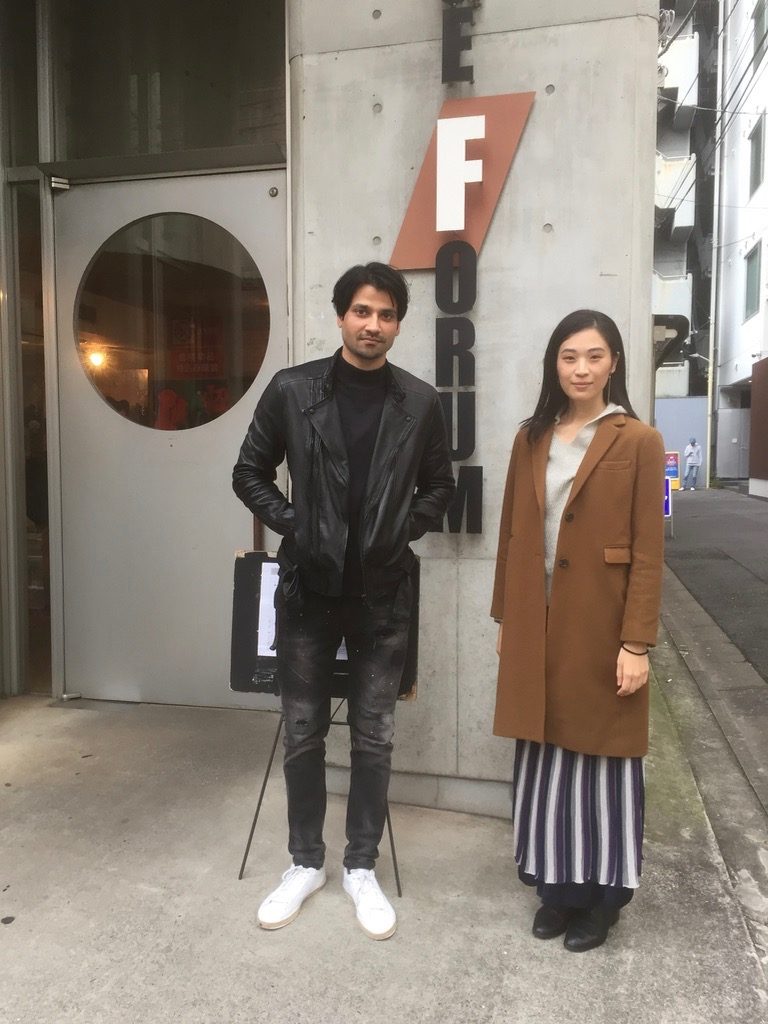1月18日から渋谷のシアター・イメージフォーラム他で公開が始まる映画「東京不穏詩」。監督はインド出身のアンシュル・チョウハン、主演はイギリスで演劇を学び活動した後帰国した飯島珠奈。多くのシーンを即興で撮影したと言う本作は、俳優の芝居の強度において特異な高みに達している。東京で女優を目指しているジュン(飯島珠奈)は恋人のタカ(望月オーソン)に貶められ顔に傷を負い、お金も奪われ故郷へ帰る。旧友のユウキ(川口高志)との再会に心休まるひと時を得るが、近親者の死と粗暴な父親との関係において再び精神のバランスを崩していくと言う物語だ。即興という手法が緩慢に陥らず、人間の複雑さや、一人の人間が抱える多面性を飯島の演技は炙り出している。凝縮された緊張感を保ちながら疾走する本作は俳優とアンシュル監督(昨年末、次作の映画「コントラ」でエストニアのタリン・ブラックナイト映画祭でグランプリ受賞が発表された)の細かな対話なくしては生まれなかったのではないかと思う。「東京不穏詩」創作の秘密をアンシュル・チョウハン監督と主演の飯島珠奈に同時に聞いた。(English follows Japanese)
アンシュル監督はCGアニメーターとして働いていると聞きました。何故長編映画を製作したのでしょうか?
(A.C)仕事としてはCGアニメーターとしてインド、日本で働いて来ました。日本に来たのは2011年にポリゴン・ピクチャーズという会社がディズニー映画のプロジェクトで呼んでくれたのがきっかけです。しかし暫く働いているうちに、何か他のことをしてみたくなったのです。その時カメラに興味を持って買って、身の回りの物事をなんでも撮影して編集してみました。以前は詩や短編小説を書いていたこともあるのですが、何かより物語性のあるものを書いてみたくなったのです。しかしシナリオの書き方がわからなかったのでタランティーノ監督の「ジャッキー・ブラウン」を読み、映画のシナリオのフォーマットを学び、これなら自分も出来るのではないかと思いました。それで短編映画の脚本を書き撮影した後、長編映画をに挑戦しようと思いました。その後一時的に仕事を辞め、インドに戻って長編映画を撮りました。その後再び日本に戻り、初めてプロとして撮影監督や録音技師などを雇って3本短編映画を撮り、その3本それぞれに飯島さん、望月さん、川口さんにでてもらいました。それは私にとって「東京不穏詩」を撮る上でのテストの意味合いもありました。
アンシュル監督と飯島さんは、初めどのように知り合ったのでしょうか?
(A.C)僕の知り合いのドイツ人監督が作っていた短編映画に彼女が出演していて、僕はその映画の編集技師だったのです。飯島さんがとても良いと思って、監督に彼女の連絡先を教えてもらいました。
この映画では、男性による暴力など女性を取り巻く過酷な状況が描かれています。日本社会の男女格差など、この映画に影響しているのでしょうか?
(A.C)脚本を書いている時に、日本の社会問題について考えたりはしませんでした。ただ個人的に、夫や父親から殴られていたという知り合いのインドや日本の女性達から話を聞いたりはしました。そうした話を1つにまとめたのです。この映画で描かれていることは世界の何処でも起こっていることだし、意識して見れば問題は日々起きている事が分かるはずです。
撮影前、撮影中はどのような話し合いが行われていたのでしょうか?
(A.C)映画に関する事よりも、俳優たちの個人的な話を聞きたいと思っていました。飯島さんを俳優と言うよりも、一個人として理解しようと努めていました。理解するために僕の家で、リハーサルを2日間しましたが僕は演技を事前に完璧にしたり、絵コンテ通りに撮影する事が好きではありません。出来るだけ俳優たちとキャラクターを探る旅をして、映画制作そのものを冒険の様にしたいのです。自分たちが何処に行く事が出来て、たどり着くのか見えすぎていない方が楽しいのです。飯島さんをなるだけ理解する事で、ジュンというキャラクターに真実味が生まれて、良い方向に行けるのではないかと思ったのです。
初めて「東京不穏詩」の脚本を読んだときはどのような感想を持ちましたか?
(S.I)私が初め読んだものは撮影時の台本とは違って、よりジュンというキャラクターに比重が置かれていました。ジュンの夢の中のシーンなどもあって、素晴らしいものでした。何れにしても初めて読んだときは物凄い密度の強さを感じました。ジュンは燃え盛る炎のように強烈で、過去にその様なキャラクターを演じたことはありませんでした。ジュンも私も同じように女優であり、内面に何かを抱えているが私はそれを何処でどのように吐き出せばいいのかが分からない。ジュンを通して私の中のこの思いもどうにかできるのではないか、と思いました。また私もジュンと同じように女優として、私個人として、何かを変えてくれるような出会いを探していました。そしてこのジュンというキャラクターこそが私が探していたものであり、絶対にこの役を演じたいと思いました。
(A.C) ジュンのハリウッドで女優になりたいという要素は、僕が飯島さんと出会った後に追加したものです。彼女のために脚本を書き直し、ジュンを飯島さんにとってより身近なものにしたかったのです。
映画で描かれていないジュンと母親のバックグラウンドストーリーは事前に作っていたのでしょうか?
(A.C)ジュンと母親との関係など、意図的に飯島さんには伝えていませんでした。なぜなら映画上、ジュンは母親のことをあまり知らないからです。撮影中は必要な情報だけ俳優に伝えました。
(S.I)ユウキ役の川口さんと私は役に関する質問をいくつかしましたが、アンシュル監督は答えを教えるというよりは、自分たちそれぞれで見つけ出すようにしていたような気がします。映画の中でユウキとジュンは以前とても親しい関係だったので、学生時代の二人はどのような感じだったか、どのように一緒に過ごしていたかなどを話し会いました。
(A.C)ジュンがバルコニーに一人で佇んでいたり、タバコを吸っているシーンやその他、脚本に書かれていないシーンをたくさん撮りました。それは僕はジュンというよりも、飯島さん自身を撮りたいと撮影中に考えるようになって行ったからです。そして沢山の場面を即興で撮影したのですが、僕はそれをどう撮るべきか、撮影現場に行ってイメージを固めました。時に他の俳優の自然な演技を引き出すためにも、飯島さんに即興で芝居をしてもらい、脚本の想定を超えた芝居が生まれるように演出しました。多くの即興芝居のシーンを最終的に編集でまとめたので、編集時は脚本を再度書いているような感覚でした。
飯島さんの演技は人間の複雑さや、一人の人間の中に潜む多層的な感情を感じさせてくれる素晴らしいものでした。役作りをする上でどのようなアプローチをして行っているのでしょうか?
(S.I)特別な方法論を持っているわけではありません。ジュンというキャラクターはアンシュル監督との対話を通して作り出していきました。彼が私を個人として理解してくれようとしていたように、私も監督をなるたけ理解したいと思っていました。何故なら脚本は監督が書いており、ジュンは彼から産まれたからです。アンシュル監督がどの様に世界を見て、どんな感情を持っているのかについて考えることは凄く役作りに役立ちました。またジュンと同じ様な経験を持つ女性たちに話を聞き、そうしたことが土台となり、ジュンについて考えていきました。アンシュル監督は、私があまり他の俳優たちとコミニケーションを取らず、孤立する様な環境づくりを撮影中に作り、また同時に結構なプレッシャーもかけられました(笑)。どれも私にとって必要なことでした。まだ未熟な私ですが、監督がいたからこそあのようなジュンができたのだと思います。
(A.C)学校などで映画製作の勉強をしてきたわけではないので、僕が分かる事といえば俳優がその役に対して真に迫っているかどうか、なんです。カメラやレンズを通して見える世界は、実生活で見える世界と異なります。もし飯島さんがジュンという役と距離感があるとカメラを通して感じたら、別の芝居のやり方を提案しました。それは共同作業だったのです。予算も潤沢にはなく撮影日数も限られていたので撮影中はどんどん現場を進めなくてはいけません。またヘアメイクを雇わず、僕が俳優たちのメイクを担当していたのですが、撮影前のメイク時間の30~45分くらいが一番俳優たちとしっかり話せる時間でした。
(S.I)撮影準備期間中、私の中で小さな存在だったジュンの存在がどんどん大きくなり、それと同時に監督の存在も私の中で大きくなっていきました。最終的には私とジュン、監督全てがないまぜになった様な感覚です。
(A.C)この映画は反復の構造を持っています。東京のオーディションシーンでジュンが自らを引っ叩いていることは、故郷の実家の階段で父親の前で繰り返されています。ここでは父親の存在を大きく見せたかったため階上に彼を居させ、階段途中にジュンを居させました。しかしジュンが自らを引っ叩く姿を見た後、父親の存在は小さく見え始めるのです。
映画の中で様々な鏡がとても効果的に使われています。監督の意図を聴かせてください。
(A.C)鏡は脚本の中でも書かれていて、かなり意識して使いました。3面鏡等を使うことでジュンの顔を3面に分けたり、タカがジュンの部屋に戻った時も彼の顔は鏡の上では2つに割れています。彼は常に二面性、もちろんジュンの事を愛していますが、同時にジュンを貶めたり、2つの顔を持っています。ジュンの顔が3面鏡に写される時も、どれが本当の彼女なのか、この後どうなってしまうのか等を想像させることが出来ます。僕はこうした映画の中の象徴的な装置が観客と映画の距離を縮めてくれる物だと思っています。
『東京不穏詩』
©2018 KOWATANDA FILMS. ALL RIGHTS RESERVED
2020 年 1 月 18 日(土)よりシアター・イメージフォーラムほか全国順次公開
監督: アンシュル・チョウハン
出演:飯島珠奈 望月オーソン 川口高志 真柴幸平 山田太一 ナナ・ブランク 古越健人 撮影監督:マックス・ゴロミドフ|プロデューサー:アンシュル・チョウハン、茂木美那 |制作マ ネージャー: ジップ・キング 音響:ロブ・メイズ|脚本:アンシュル・チョウハン、ランド・コルター |音楽:LO-SHI|制 作:KOWATANDA FILMS
配給:太秦 2018年|DCP|カラー|116分|日本|日本語 『東京不穏詩』英題:BAD POETRY TOKYO ©2018 KOWATANDA FILMS. ALL RIGHTS RESERVED
公式 HP:https://www.kowatanda.com/badpoetrytokyo
————————————————————————————————
The movie “Bad Poetry Tokyo” will be released on January 18th. The director is Anshul Chauhan from India, and the lead actress is Shuna Iijima, who returned to Japan after studying and working in theaters and movies in the U.K. Many scenes in the movie were shot with improvisational style and her extremely powerful performance breathes life into the movie. The main character Jun(Shuna Iijina), who is aiming to be an actress in Tokyo, is looked down on by her lover Taka (Mochizuki Orson), suffers a scar on her face, loses her money, and returns to her hometown. She is relieved to reunite with her old friend Yuuki (Takashi Kawaguchi), but loses her balance again in relation to the death of her close relative and brutal father. Shuna’s acting shows the complexity of a human being and the multifaceted nature in one person. The concentrated tension in the film would be created by detailed discussion between the actors and the director Anshul (His latest work “Kontora” won the Grand Prix at Tallinn Black Nights Film Festival 2019 in Estonia). I held the interview about the secret of the creation regarding “Tokyo Bad Poetry” to director Anshul Chauhan and the leading actress Shuna Iijima.
You’ve been working as a CG animator. What inspired you to make a feature film?
(A.C) Professionally, I’ve been working as a CG animator from last 13 years, first in India for 5 years then Japan. In 2011, an animation Studio “ Polygon Pictures”called me for a job here to work on a Disney XD project. But after spending a long time as an animator, Eventually I started to get a bit bored, so I bought a camera and started shooting random stuff and fell in love with the craft. Same time I also started to learn editing which pulled me more into filmmaking. I used to write poems for a long time and I wanted to make some new stories. So, I thought “let me write something and see”. In order to study a scenario format, I red Tarantino’s “Jacky Brown” and learn how to write a screenplay, and felt this is not so hard to write. So I wrote a short film, and shot it. Suddenly after that I decided to make a feature film. I quit my job temporarily, and went back to India for making the film, but it didn’t work out so I came back to Tokyo. A couple of years later, I professionally made a short film called “Soap” in Japan and it was the first time to hire a cinematographer, sound guy and make-up artist. After that, I didn’t stop, and made two more shorts. Each of the three shorts, I worked with Shuna, Orson and Takashi, since I wanted to test the actors for the next feature film” Bad Poetry Tokyo”.
How did you guys meet in the beginning?
(A.C) One of my German filmmaker friends made a short film, and Shuna was in the film. I was the editor for the short, and asked the friend to give her contact details, and emailed her.
This film depicts harsh circumstances surrounding women, like being beaten by males. Some issues in Japanese society, such as gender inequality, reflect on “Bad Poetry Tokyo”?
(A.C) Honestly, while writing, I didn’t think it happens only in Japanese society. I heard some personal stories from my female friends in India and Japan, like after getting married, they were hit by their husbands and fathers. There are many stories like that, and I put those in one story. I believe this film can belong anywhere in the world, and those problems happen everywhere if you see. Overall, while shooting the film I never kept in my head that I am making a Japanese film. It’s a fiction, can be related by anyone and anywhere.
What kind of discussions did you guys have before and while the shooting?
(A.C) It was not only about the film, but mostly about her personal stuff. I wanted to understand Shuna as a person as much as possible. We had been talking about many things, and it was not necessarily about the film. We had a rehearsal for just two days in my house, but I didn’t want to have a perfect rehearsal and story boards, I hate that. I wanted to explore characters and the film itself while shooting it. I feel more fun is to not know where you can reach and where you can go. I tried to do my best to understand her, and while shooting, I could see if she was truthful to the character or not. This is because, I understood her so well, so I could guide her.
What was the impression when you read the script for the first time?
(S.I) When I first read the script, it was not the complete version. It focused more on main character “Jun” , and there was a dream sequence while Jun is in her hometown. That was nice, but it couldn’t be shot because of the budgetary matter. Later on, Anshul added more other elements. The first version was so condensed and powerful, because Jun is so strong, like a burning fire. I’ve never seen anything like that character in the past. But I found something similar to me in her. She is also an actress as well and holding something inside, but I don’t1 know where and how to get it out. I guess I was waiting for something like this, trying to build my career as an actress and looking for something as a person and actress and felt “This is it”. I really wanted to take it.
(A.C) A part of Jun’s character, that she wants to become an actress in Hollywood was the only elements I added after meeting Shuna. I was writing the script for her and let her get more closed to the character.
Did you guys make background stories of Jun, such as the relationship with her mother?
(A.C)I didn’t tell Shuna the background stories purposely, because in the film, Jun doesn’t know about her mother. Sometimes actors ask many questions, but I don’t like that. I only gave them information which I think is necessary for the particular scene.
(S.I) Takashi and me asked Anshul a couple of questions. But he didn’t tell the answers, so that, it lets us think and imagine about the characters. Therefore, we talked about how we (Jun and Yuuki) were back then, how we spent time together, how we walked back from school to home, since Jun and Yuki used to be really close. It was just a talk, and not like the answer and asking Anshul if it were right or wrong. It was not like that.
(A.C) I shot many scenes which weren’t written in the script, such as Jun just sit and smoke in the balcony without dialogue. I wanted shoot her as Shuna Iijima, not as Jun. While shooting, honestly, I didn’t know how to shoot scenes. I didn’t plan it. Once I went locations, everything would come in my head. Also, I sometimes asked Shuna to improvise a scene in order to reveal more natural reaction and performance from other actors. In the editing, I put everything together, it was like re-writing the film.
I was really resonated with the performance of Jun. You expressed complicity of human being and multilayers of emotion in one person. Could you tell me about your approach to create a character for a film.
(S.I) To be honest, I don’t have a specific method. How I established the character was talking through with Anshul. He tried to understand my personality, and vice versa. I had to study him, since he wrote the script, and the character Jun came from him. To know how Anshul see the world and what kind of feeling he has really helped me. Also, I talked with friends who had similar experiences, that Jun had. These were the start, and then everyday I started thinking about Jun. As the shoot goes, I felt Jun more and more. Ahsul tried to create the atmosphere for me, like not to talk with other people and being alone. And he gave me a lot of pressure as well (lol).
(A.C) I’m not a trained film maker from school, so I just know one thing that if the actor is looking truthful to the character or not. When you see things from a camera and lens, it changes you perspective and you look at real life differently through it. When I saw her from the camera, if she was doing something, which was not related to the character, I talked with her and said “let’s try like this” . It was like collaboration. The budget didn’t allow us to have plenty of time for the discussion, and I did makeup for actors every morning before the shooting, because we didn’t hire a make-up artist. The makeup time took about forty five to thirty minutes, and it was the only time for me to talk to Shuna in peace and prepare for the day.
(S.I) In the beginning of the pre-production when I read the first draft, Jun was small inside me. But then, my part got smaller, and Jun got bigger and bigger and Anshul got bigger as well. And towards the end, it was all mixture.
(A.C) The film has loop structures, such as slapping herself at the audition scene in Tokyo, which the action was repeated in her hometown in front of father. In that scene I wanted to show her father more powerful, and Jun looked smaller. I put the father on the top of the stairs in order to look him big, but still small after watching what Jun did.
There are some scenes, that mirrors were effectively utilized. What was your directorial intention for the scenes?
I intentionally used the mirrors, and it was written in the script. I wanted to split the personality and character of Jun by using mirrors, two faced or three faced or confused. I tried to represent those side of her character by using multiple mirrors. Also you can see Orson’s face on two mirrors as if two dimensions of his character when he came back to her room. He is always two faced, of course he loves Jun, but he lets his friend to rob money of Jun. when Jun looked at her face through the trifold mirror, you can see three persons, like whom actually she is and what she is becoming. I believe, these subtle metaphors would connect the audience to the film.
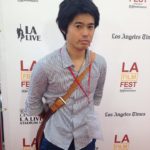
<p>戸田義久
普段は撮影の仕事をしています。
これ迄30カ国以上に行きました。これからも撮影を通して、旅を続けたいと思ってます。趣味はサッカーで、見るのもプレーするのも好きです。
